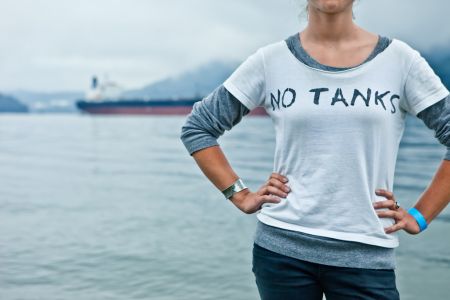The proposed Enbridge Northern Gateway Project has been the catalyst for fiery debates over the relationship between energy, the environment, the economy and human rights — and provided a test for which of these the Canadian government holds highest in its esteem.
The twin pipelines, if approved, will run from Bruderheim, AB, to Kitimat, BC, importing natural gas and exporting crude oil and bitumen. They will cross British Columbia’s wilderness and First Nations lands. Some say they will provide vital jobs and a boost to the economy; others say they will bring environmental destruction, affecting ecosystems and human livelihoods.
Greer Kaiser is a Nova Scotia native currently living in northwest British Columbia. The proposed pipeline route runs close to her home. Since the project was announced in 2006, Kaiser has been involved in the British Columbia movement against Enbridge. She has participated in demonstrations, and has giving her testimony at the Enbridge Northern Gateway Project Joint Review Panel, an independent body reviewing the environmental effects of the proposal.
On Aug. 7, Kaiser will be speaking at the Tankers vs. Tank Tops BBQ event hosted by Sierra Club Canada – Atlantic Chapter, the Ecology Action Centre, and the Atlantic Canada Sustainable Energy Coalition.
Natascia Lypny (NL): Public opinion surveys have shown Canadians and, more specifically, British Columbia residents are divided on whether the pipelines are a good idea or not, with many stating they are unsure of their, or have no, opinion on the matter. Why do you think that is?
Greer Kaiser (GK): Well, for one thing, Enbridge has an open wallet, and I'm sure you're aware mainstream media isn't mainstream anymore. People are opposed … Everybody I meet is against it. So I'd love to know where these numbers [come from] … It's biased reporting on who's actually opposed.
NL: Why should Nova Scotians, or anyone outside of Alberta or British Columbia, care about this proposed pipeline?
GK: I was born and raised in Nova Scotia. I lived here until I was 25 years old. We're coastal people. We understand the importance of water. We understand that oil and water don't mix … and we understand the devastation that's going to happen to the environment and all the fall out. So I think people who live on the coast — whether it's the Atlantic, whether it's the Pacific — we just get it. We understand the dangers of this sort of thing.
NL: Why is British Columbia particularly vulnerable to environmental damage from the proposed pipeline?
GK: We've been under the provincial Liberal government for ten years and Gordon Campbell, and now his little puppet, Christy Clark, are just all too happy to sell out the province for any price. In our area, [we’ll get] a couple hundred jobs maximum, but the risk isn't worth it at all. We're shouldering all the risk, those of us who actually live in the area. Christy Clark never comes up. She doesn't live there. It's not going to affect her.
NL: What do you say in response to the proponents saying this project will bring jobs, money and other benefits to British Columbia residents?
GK: (laughs) Call me a pessimist, but there's not going to be any jobs for construction. They [the workers] are going to be shipped in from other countries: they're going to come up from Texas; they're going to come from Alberta. There will be a few jobs but as far as the construction jobs and stuff? That's all going to be shipped out; that's not going to be local. So really the jobs are going to be a couple of monitoring things. There will be some jobs in the Port of Kitimat, but that's negligible at best.
NL: There is a concern that this pipeline will harm other sectors of the economy. Why is that?
GK: Well, if there's a leak, or an oil tanker goes aground, yeah. We lost our logging industry ten years ago, and we've got fishing left, but heaven forbid there's an oil spill. And Indigenous people — that's their food source: the rivers, the animals that are around there. We're talking about the whole ecosystem [being affected].
NL: How can Nova Scotians participate in this discussion around the Enbridge pipeline?
GK: I think what's important is we continue to talk about it, we continue to say 'No, we're opposed.' … We understand the company [Enbridge]: we know their tactics; we know how much money they have; we know that they're all about profit. They don't care about the environment. They don't care about the people; it's all about the profit. I think that's something that's common between Maritimers and BC-ers: we understand that people are important, and money and the almighty profit of the corporations — that's not important.
This interview has been edited for length and clarity.



